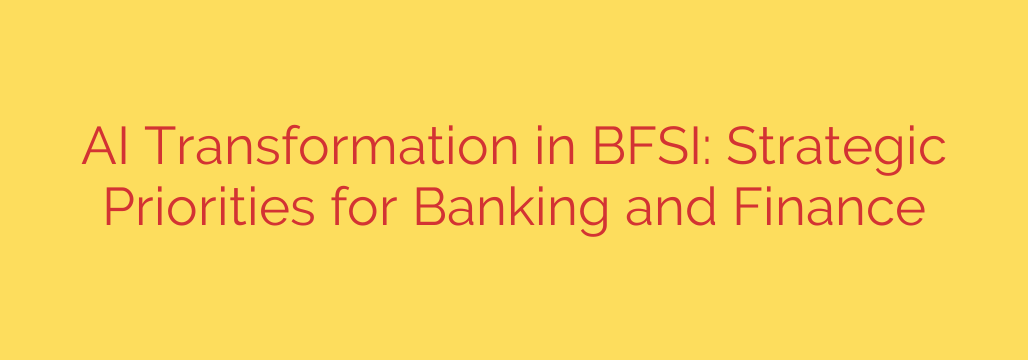
Artificial intelligence is no longer just a concept for the future; it’s a present imperative for success within the Banking, Financial Services, and Insurance (BFSI) sector. The rapid evolution of technology and shifting customer expectations demand a strategic approach to AI integration. For financial institutions navigating this transformation, identifying and focusing on key strategic priorities is crucial to unlocking true potential and staying ahead in a competitive landscape.
One of the foremost priorities is fundamentally enhancing the customer experience. AI enables hyper-personalization, offering tailored product recommendations, instant support through intelligent chatbots, and streamlined digital journeys. By analyzing customer data, AI can predict needs and proactively address them, fostering loyalty and satisfaction. This move towards an intuitive, personalized, and always-available service model is paramount.
Secondly, achieving significant improvements in operational efficiency is a critical goal. AI-powered automation can handle repetitive tasks like data entry, document processing, and compliance checks, freeing up human staff for more complex, value-adding activities. This not only reduces operational costs but also speeds up processes, such as loan applications or claims processing, leading to faster service delivery and improved productivity across the board.
Another vital area is strengthening risk management and fraud detection capabilities. The BFSI sector is particularly vulnerable to financial crime and market fluctuations. AI algorithms can analyze vast datasets in real-time to identify suspicious patterns, flag potential fraud, predict credit risks, and monitor market trends with greater accuracy and speed than traditional methods. This proactive approach minimizes losses and ensures compliance with evolving regulations.
Laying a robust data foundation is a non-negotiable strategic priority for successful AI adoption. AI systems are only as good as the data they learn from. Financial institutions must invest in collecting, cleaning, integrating, and managing high-quality data from various sources. A unified, accessible, and well-governed data infrastructure is essential for training effective AI models and deriving actionable insights.
Furthermore, addressing the talent and culture aspect is equally important. Implementing AI requires not just technology but also people with the right skills and a culture that embraces innovation. Financial firms must prioritize upskilling existing employees and attracting new talent with expertise in AI, data science, and machine learning. Fostering a culture of experimentation, collaboration, and continuous learning is key to maximizing AI’s impact and ensuring smooth adoption.
Finally, establishing strong governance and ethical frameworks for AI usage is imperative. As AI becomes more embedded in critical processes, ensuring transparency, fairness, accountability, and security is paramount. Financial institutions must develop clear policies, guidelines, and oversight mechanisms to manage the risks associated with AI, build trust with customers and regulators, and comply with data privacy and AI-specific regulations. Focusing on these strategic priorities allows BFSI firms to harness the transformative power of AI, driving growth, improving resilience, and delivering superior value in the digital age.
Source: https://www.datacenterdynamics.com/en/whitepapers/strategic-imperatives-prioritizing-your-ai-transformation-for-banking-and-financial-services/








